Business in the Kyrgyz Republic. Kyrgyz Economy. Bishkek
Kyrgyz Republic (International Trade): Central Asian Trade Oasis. Silk Road, Logistics. Jalalabad oblast
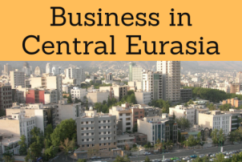
The Kyrgyz Republic: The Central Asian Trade Oasis.
Kyrgyzstan has a huge natural resources reserves and fresh water
Strong economic cooperation with Pakistan
Top sectors of the Kyrgyz economy are hydro-power, mining, agriculture, tourism, food processing industry, and building materials
Main Kyrgyz mineral resources are gold, tungsten, aluminum, and coal

- Introduction to the Kyrgyz Republic (Kyrgyzstan)
- Kyrgyz Economy
- Economic Profile of the Kyrgyzstan regions
- Kyrgyz Banking System
- Doing Business in Bishkek
- Foreign Trade of the Kyrgyz Republic. Custom regulations
- Investment in Kyrgyzstan
- Reasons to Invest in Kyrgyzstan
- Business Opportunities in the Kyrgyz Republic
- Tourism
- Light industry
- Kyrgyz Agro-industrial sector
- Transport and Logistics
- Mining
- Electric-power industry
- Case Study: Kumtor Gold (33% of the Kyrgyz export of goods and services)
- Access to the Kyrgyz market
- Business Plan for Kyrgyzstan

The educational aims of the Subject “Foreign Trade, Logistics and Business in the Kyrgyz Republic” are:
- To analyze the Kyrgyz Economy, Logistics and Foreign Trade
- To conduct research on business opportunities in the Kyrgyz Republic
- To explore the Kyrgyz trade relations with the student's country
- To learn about Kyrgyz Trade Agreements
- To examine the profile of Kyrgyz companies
- To develop a business plan for the Kyrgyz market

The Subject “Foreign Trade, Logistics and Business in Kyrgyzstan” is included within the curriculum of the following academic programs at EENI Global Business School:
Masters: International Business, Foreign Trade.


Masters adapted to  Kyrgyz Students.
Kyrgyz Students.
Languages:  (
( Kyrgyzstán
Kyrgyzstán  Kirghizistan).
Kirghizistan).
- Subject Credits “Doing Business in Kyrgyzstan”: 1

- Almaty-Bishkek Logistics Corridor
- Kyrgyzstan-Iran Logistics Corridor
- Silk Road
- North-South Corridor (India-Russia)
- Europe-Caucasus-Asia Logistics Corridor
- Trans-Caspian Logistics Corridor
- China-Central-West Asia Logistics Corridor
- Access to the:
- Islamabad-Istanbul Corridor
- India-Chabahar (Iran)-Afghanistan Economic Corridor
- China-Pakistan Economic Corridor
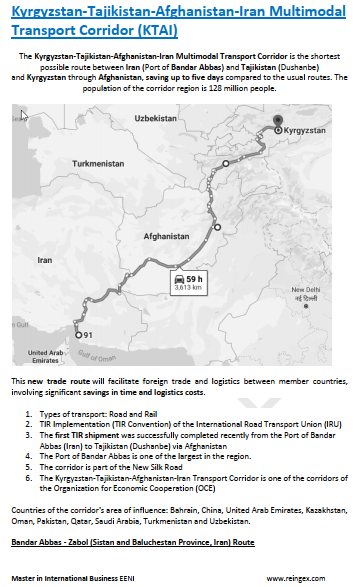
Kyrgyz Preferential Access and Trade Agreements:
- Kyrgyzstan and the Central Eurasian Economic Area
- Eurasian Economic Union
- Eurasian Economic Union (EAEU)-Vietnam Agreement
- Commonwealth of Independent States
- Economic Cooperation Organization (ECO)
- Shanghai Cooperation Organization
- Turkic Speaking State (Түрк кеңеш)
- Central Asia Cooperation (CAREC)
- Agreement on trade and economic cooperation between the Kyrgyz Republic and Pakistan
- Kyrgyzstan-Russian Federation Agreement
- Kyrgyzstan-Armenia Agreement
- Kyrgyzstan-Kazakhstan Agreement
- Kyrgyzstan-Moldova Agreement
- Kyrgyzstan-Ukraine Agreement
- Kyrgyzstan-Uzbekistan Agreement
- Trade Preferential System (OIC)
- Most-favoured-nation treatment regime

- World Trade Organization (WTO)
- Agreement on Trade in Services (GATS)
- Agreement on the Application of Sanitary Measures
- Agreement on Technical Barriers to Trade
- Agreement on Preshipment Inspection
- Agreement on Safeguards
- Trade Preferential System (TPS-OIC)
- World Customs Organization (WCO)
- Kyoto Convention
- Convention Harmonization of Frontier Controls of Goods
- Organization for Cooperation between Railways (OSJD)
- BIC (Containers)
- Chicago Convention (ICAO)
- International Maritime Organization
- Customs Convention on Containers
- Istanbul Convention - not a member
- International Road Transport Union (IRU)
- TIR Convention
- Guidelines on Safe Load Securing for Road Transport
- Iran-Pakistan-Turkey Transit Transport Framework Agreement (TTFA)
Islamic Organizations. Kyrgyzstan is a member of:
- Organization of Islamic Cooperation (OIC)
- Islamic Development Bank
- Arab Development Funds
- Asia-Middle East Dialogue
- Member of the Central Asia-South Asia Regional Electricity Market (CASAREM) with Afghanistan, Kyrgyzstan, Pakistan, and Tajikistan
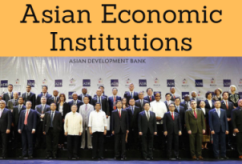
- Economic Commission for Asia (ESCAP)
- Asian Development Bank
- Asia Cooperation Dialogue
- Africa-Asia Partnership

- United Nations
- World Trade Organization (WTO)
- Organization for Security and Cooperation in Europe (OSCE)
- United Nations
- World Bank
- World Trade Organization (WTO)
- International Monetary Fund
Kyrgyzstan was a member of the Eurasian Economic Community (EurAsEC) - Succeeded by the Eurasian Economic Union (EAEU).
The Kyrgyz Republic
- Kyrgyzstan has a strategic position (trans-shipment, the Silk Way) between Europe and Asia
- Kyrgyz Population: 5.6 million people
- Literacy rate: 98%
- Capital of Kyrgyzstan: Bishkek
- Official language of Kyrgyzstan: Kyrgyz language (based on the Cyrillic alphabet)
- Russian is also spoken in the Kyrgyz Republic
- Kyrgyz Area: 199,951 km²
- Borders of the Kyrgyz Republic: China, Kazakhstan, Tajikistan, and Uzbekistan
- Kyrgyz independence: 1991 (from the Soviet Union)
Kyrgyzstan belongs to the Central Eurasian Economic Area (Islamic Civilization).
- The Kyrgyz Republic belongs to Sunni-Turkic cultural area of Islamic Civilization

Religions and Global Business -
Religious diversity

Main religion in Kyrgyzstan:
- Islam (80% of the Kyrgyz population)
- Orthodox: 20%
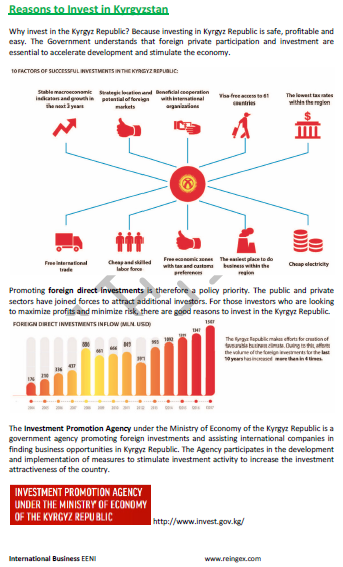
Economy of the Kyrgyz Republic.
- Kyrgyz food processing industry (10,000 enterprises): sugar, fruits, milk, and cereals
- Kyrgyz exports: precious metals, electricity, agricultural products, industrial goods, food processing products, and textile
- Kyrgyzstan has a liberal trade regime
- Five Free Economic Zones in Bishkek (2), Naryn, Karakol, and Maimak
- Jalalabad oblast: significant industry, mineral resources, agriculture, and tourism
- Access to the Eurasian Land Transport Initiative
International Trade and Business in Kyrgyzstan:
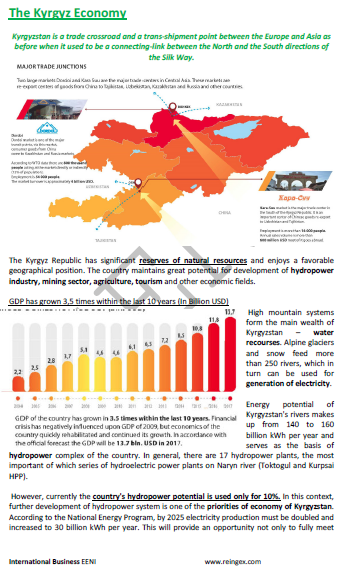
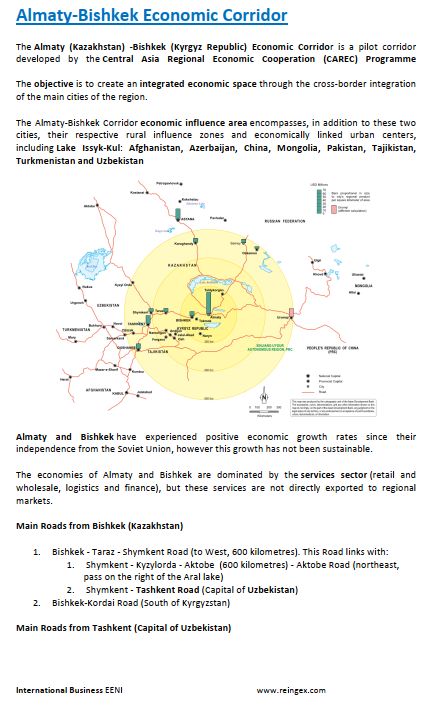
(c) EENI Global Business School (1995-2025)
Top of this page









 WhatsApp
WhatsApp